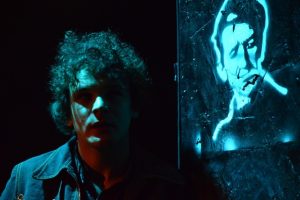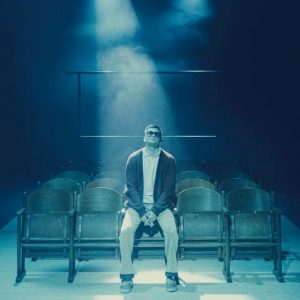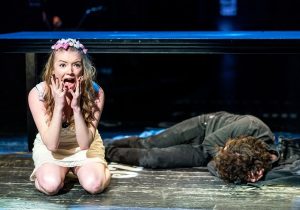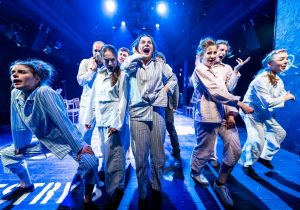There are stage plays that run for years to spectacular successes. Written and staged by renowned artists. Played to capacity-filled auditoriums in different countries. Cf. Twyla Tharp’s The Times They Are a-Changin’ or Conor McPherson’s Girl from the North Country.
But I’d like to tell you about something completely different. A play of an ephemeral life, very well-conceived and written and fabulously played by students only to merit their acting college degrees.
In Poland, part of the acting schools are public. In order to get a degree, aspiring actors have not only to write theses but also to be cast in so-called “degree-plays”, plays that are either adaptations of existing dramas, or newly-conceived works.
One of the most important Polish acting schools is Leon Schiller National Film School in Łódź. Among its alumni, there are many great film and theatre artists: Roman Polański, Jerzy Skolimowski, Zbigniew Rybczyński of the Tango fame, Andrzej Wajda.
This year’s graduates prepared three plays. One of them was written by a renowned Polish musical director Wojciech Kościelniak. It is entitled 115 sen Boba Dylana, or “Bob Dylan’s 115th Dream”.
The plot tells a story of one Robert Zimmerman (Wiktor Dębski) who arrives in New York City in the early freezing weeks of 1961 and searches for the opportunity to see his idol Woody Guthrie. He’s determined to follow Guthrie’s footsteps and sing his mentor’s songs, or songs Guthrie sang.
While meandering through famous and not-so-famous places he meets several people, as if in a dream, some of them fictitious and some of them real. He learns about the realities of the music business and its expectations (that’s the lesson he gets from Kapitan, played by Kirył Pietruczuk), and he is made aware by a blind girl Moonbird (Karolina Kowalska, a variation on the figure of Louis ‘Moondog’ Hardin) that the only sense in pursuing a career is in being true to oneself and so he has to think of expressing himself and not only mimicking his hero.
He tries to find comfort in the arms of women – a married cloak keeper Chloe (Emilia Lewandowska) and young posh-raised activist Suze (Maria Adamska). He is figuratively told about the dangers of fame through the tale of Edie (Aleksandra Bernatek). Other people he meets are Queequeg (Hubert Sycz) of “Pequod”‘s fame and two clown-like figures Tirli Bim (Marcin Walkowski) and Tirli Bom (Bartek Dargiewicz) who act as commentators of the events.
And, last but not least, in this dream-like, Brechtian landscape he listens to tales of greed and despair, told by Mrs. Thomas (Olga Rayska) and Black Lady (Oliwia Adamowicz).
Eventually, Zimmerman-turned-Dylan he comes to the mental hospital where Woody Guthrie is confined to a bed, and sings him his tribute.
Not much of a plot, apparently.
But what struck me was the way it was all written, staged and played.
The libretto is based on Bob Dylan’s interviews, on his Chronicles Vol. 1, excerpts from Tarantula, Kościelniak’s own ideas – and the songs, in yours truly’s translations (which applies to Tarantula, too). And in spite of its apparently sketchy character, it all seems well-crafted and engaging, the intrigue is not difficult to follow.
These students are of course very young people. And yet they absorbed the storyline and its intricacies, they act and sing with conviction, making the songs their own. They are THEN and THERE, in the 1961 New York and New Jersey. They mention names that are next-to-anonymous to the majority of people in Poland – Woody Guthrie, Dave Van Ronk, Joan Baez, Pete Seeger, Carolyn Hester, Edie Sedgwick, Suze Rotolo – and they seem to know who they talk about.
They managed to capture the audience’s attention fully, through an over-3h-performance. Incredible.
The songs are very cleverly arranged. They do not copy the existing Dylan-wannabes, they do not try to emulate the folk scene. It’s the theatre and its isolated world, and its one-of-a-kind reality requires something different. The students of Łódź’s Music Academy made splendid arrangements, played by a foursome of upright piano, drums (with a djembe), bass guitar and electric guitar, and the music is something unique between, say, Kurt Weill and trip-hop.
Finally, the selection of songs is rather unusual. All songs bar two are long pieces, and the actresses and actors sing them in their entirety, no short cuts. Just see:
The Times They Are a-Changin’, sung by Tirli Bim
Tweedle Dee and Tweedle Dum, sung in parts, throughout, by TIrli Bim and Tirli Bom:
It’s Alright, Ma (I’m Only Bleeding), sung by Kapitan [photo from a different play]:
A Hard Rain-s a-Gonna Fall, sung by Chloe:
Like a Rolling Stone, sung by Edie: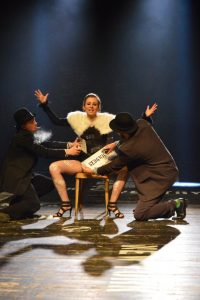
Tempest , sung by Karolina Kowalska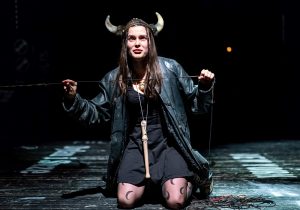
(all 49 verses, and she manages to keep us on a short lead):
North Country Blues, sung by Mrs. Thomas: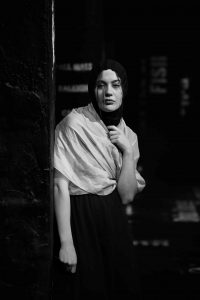
sung by the whole cast:
Thereafter we had Hurricane, sung by Queequeg, Black Diamond Bay, sung by Black Lady, Gotta Serve Somebody, sung by Tirli Bom, and Song to Woody, sung by Zimmerman/Dylan:
What more can I say? It was impressive. It was moving. It was hope-bringing.
And sadly, it was a fugitive. The School has no rights to perpetuate the event so there was no nor will be any recording, sound- nor videowise. Thus, I just want to spread the message of young Poles who, for a couple of months, have been recreating the world of Dylan songs and his world. And they inhabited it.
After one of the shows, the one that I attended, I met them and we talked for a while. And I could see they were sorry to become aware it was not going to live much longer. They knew they’d done something special.


